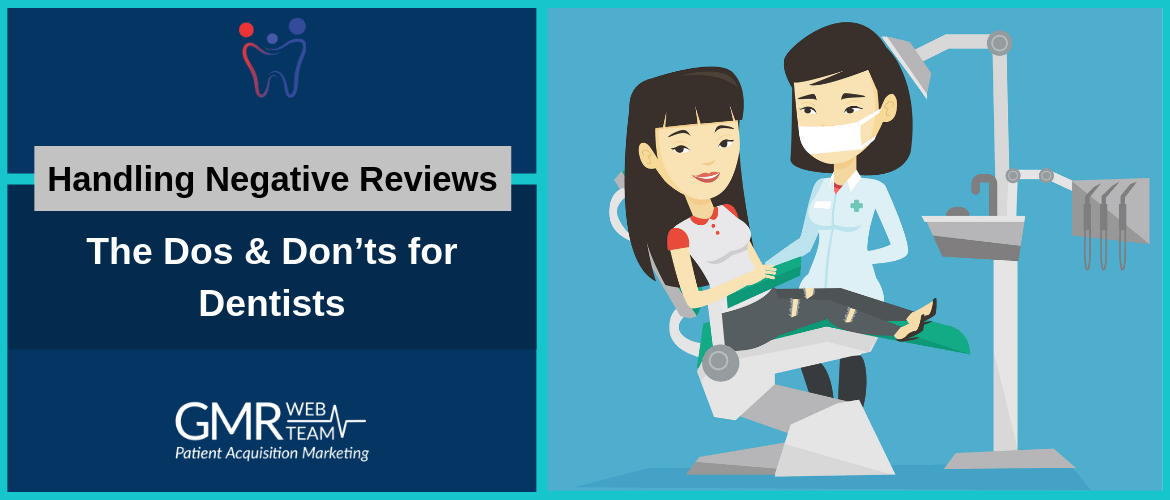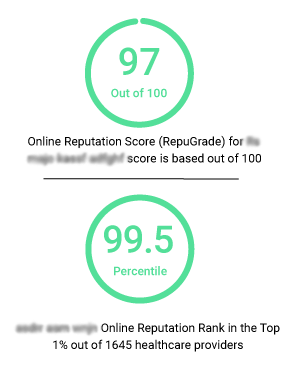Handling Negative Reviews: The Dos & Don’ts for Dentists

Negative reviews, if not handled properly, can make your dental practice pay significantly. Even a small mistake, like acknowledging the reviewer as your patient (in your response) may put your dental practice in serious trouble. You may have to pay huge fines or go through the hassle of a trial. There are several instances where medical professionals’ responses to complaints led to disputes over patient privacy.
A 2016 ProPublica investigation of 1.7 million Yelp reviews found dozens of such cases related to dentists and other medical professionals. In one case, a dentist from California was warned by the U.S. Department of Health and Human Service for divulging personal information about a patient. In another case, a New York dentist was being investigated for the same privacy violation issue. It’s not just how you respond that matters in your strategy to handle negative reviews. You need to consider other things as well. Some of those things include handling libelous (highly defaming) reviews, gaining more positive reviews to nullify the effect of negative reviews, and keeping compliance with guidelines from involved parties—HIPAA (Health Insurance Portability and Accountability Act), the Federal Trade Commission, and the review websites. After reading this blog, you’ll understand the Dos and Don’ts of handling your patients’ negative reviews:
Dos of Handling Negative Reviews
1. Locate new reviews through notifications
Before you can do anything, you’ll need to locate any negative reviews you may have. Since there are hundreds of review sites out there, it’s difficult to keep track of all the profiles you have. The best way to stay aware is through setting up automatic notifications. Here are the three ways you can do that:
-
Create an alert: Using tools like Mention and Reputology, you can easily monitor important review sites to locate patient reviews. To set up the notification alert on Mention, all you have to do is provide the desired search terms for which you want to receive alerts; for example—your name, the name of your practice, and your co-providers' names. And, that's it! Every time your patients mention these terms in their review content on any review site, you'll receive a notification in your mailbox.
-
Claim your review site profiles: Another recommended approach to locate patient reviews is by claiming your business profiles on major review sites like HealthGrades, Yelp, Vitals, etc. Review sites may create a free profile in your business’ name even if you haven’t created one there. By claiming your accounts on these platforms, you’ll become eligible to receive notification alerts on review submissions, thus allowing you to handle them appropriately.
-
Utilize reputation management software: An even smarter way to track negative reviews is using an online reputation management tool. Find a tool that not only facilitates patients in writing reviews, but also allows them to post those reviews on different review sites in a single click. Ideally, this tool should also prompt you when a negative review is posted to initiate service recovery.
2. Respond to negative reviews
Unfortunately, you can’t just ignore negative reviews, hoping they will go away. It’s essential that you respond to them to take control of the situation and turn them into opportunities for growth. “Responding to negative reviews shows potential patients that you care and will respond to their concerns if any should arise,” says Dr. Jennifer Silver, DDS & Founder at MacLeod Trail Dental. According to Dr. Silver, “Other people scanning through your reviews will see this effort, and it can help erase some negative connotations associated with seeing a bad review. We have done this before and 1 out of every 3 patients will generally return and give your dental clinic another try.” Here are some guidelines for dentists to keep in mind while responding to negative reviews from unhappy patients:
-
Take a deep breath: Quickly responding to a negative review is important. However, do not respond immediately especially if you are upset yourself. The last thing you want to do is unintentionally disclose an unhappy patient’s personal health information, or say something you don’t really mean. If a negative review comes in, take a breath, step away from the computer if necessary, and come back when you’ve had a chance to collect yourself. Generally, it’s a good practice to respond to a review within 24 to 48 hours of it being posted.
-
Review the patient’s experience:
- Is your front desk and other staff providing your patients with the help they need?
- Are they welcoming, friendly, and professional?
- Do your patients have to wait a long time?
- Do you provide enough time and attention to your patients during their appointments?
Knowing how your practice is performing on the patient experience front will help you gain a better understanding of your unhappy patients’ concerns. You are then able to craft an informed response.
-
Own your mistakes: If you find that your unhappy patient’s concerns are legitimate and can be addressed, acknowledge them. Owning your mistakes and offering to fix the issue is the best way to minimize the adverse impact of a negative review. Moreover, it will make you look respectable and trustworthy among potential patients too.
-
Craft a one-time response: Keep your responses to negative reviews simple, straightforward, and short. Avoid getting pulled into a discussion online. Responding multiple times is not a good thing from an online ranking point of view as it can improve the searchability of your negative reviews.
-
Write to dispel your potential patient’s fears: Your responses to negative reviews should provide a glimpse into how you address your patients’ concerns. It helps in overcoming the doubts and fears of your potential patients. According to Levi Olmstead, Community Manager at G2Crowd, a leading business solutions review platform, “showing your readers how you respond to negative reviews allows you to turn negative experiences with customers into brand advocates, all in a public space—which shows your potential patients that your business cares.”
3. Take complex matters offline
According to the HIPAA guidelines, dentists and other medical professionals are not allowed to respond to negative reviews in cases where personal health information is disclosed—even in cases where patients themselves have disclosed them. In those circumstances, take your response offline and address your unhappy patients’ concerns personally. Contacting personally through email or phone creates a much better emotional impact on your unhappy patients. This allows you to show them that you care and may even present an opportunity to resolve their concerns. Such a level of cooperation helps in dramatically shifting your unhappy patients’ opinion about you. As a result, they may feel encouraged to remove or update their bad review after their issue has been resolved. Note: Make sure you have your patients’ written consent before contacting them by email as many states require it for communicating electronically with patients. Phone calls do not require any written consent. In case, where you’re unable to identify the unhappy patient, you can politely ask them to contact you personally to talk about the issue. Also, in any of these cases, don’t forget to show professional courtesy and apologize for the inconvenience.
4. Have objectionable reviews removed
Reviews that seem to be fraudulent or highly defaming can severely damage your reputation, and so they need to be removed. However, every review website has their terms and conditions, and you will need to work with them to have any libelous content removed. If you are still unable to get the libelous review removed, you’ll need to contact a lawyer. Just keep in mind that you must not respond to the review that you’re seeking to get removed.
Don’ts of Handling Negative Reviews
1. Do not threaten a patient to take off the negative review
Do not even think of threatening your unhappy patients to take down their negative review. That’s not just morally wrong, but also illegal. The Federal Trade Commission (FTC) doesn’t allow you to sue consumers or penalize them financially for posting negative reviews or complaints. There have been cases where dentists have threatened their patients offline, which only made matters worse. Patients wrote follow-up reviews talking about how they were threatened for sharing their opinion.
2. Do not restrict negative reviews from getting posted online
If you’re using a reputation management software to solicit reviews from patients, make sure the software allows both happy and unhappy patients to post their reviews online. Discouraging unhappy patients from posting a negative review online, or selectively soliciting positive reviews is a practice not allowed by Google, Yelp, and other major review websites. RepuGen is a leading healthcare online reputation management software that “complies with the guidelines and regulations laid down by each concerned authority, such as review websites, HIPAA, and the FTC,” says Shivani Nath, the Product Manager. According to Miss Nath, “More than being an online review management software, RepuGen is a patient satisfaction software. It works on the logic that if the dissatisfied patients are attended to immediately, their satisfaction level will automatically go up and consequently, online reviews will improve.”
3. Do not incentivize for obtaining positive reviews
You may be thinking that offering your patients gift cards is a great way to get some more positive reviews online. Although there’s no harm in encouraging happy patients to leave positive reviews, incentivizing them is a bad idea. Why? First, the Federal Trade Commission requires any incentives to be disclosed in the online reviews. And second, major review websites, including Google and Yelp, do not allow incentivizing for reviews. Incentives may include free services, teeth whitening, movie tickets, and even flowers. RepuGen helps you ask for reviews with follow-up emails and text messages, which is legally and ethically the best way to obtain authentic reviews from your patients. Just make your hygienists ask your patients to leave reviews, as they are the ones who spend more time with patients.
Negative Reviews Provide an Opportunity to Improve
The positive side of negative reviews is that they shine a light on areas of improvement for your practice. Dentists who understand this, should seek to implement a tool like RepuGen to help them effectively monitor and measure patient satisfaction. These are artificial intelligence enabled tools that process the obtained patient feedback and provide actionable insights. Through intuitive charts and reports, you are able to see what your patients like and dislike about your quality of care and service. The reports contain separate segments of data and insights for happy and unhappy patients. GMR Web Team, we offer the most comprehensive online marketing solutions for dentists. Our dental care marketing strategy considers a thriving online reputation for dentists a priority. With RepuGen, our proprietary reputation management software, we help you gain the most out of your reputation management efforts.
Read Also: Online Marketing for Dentists: A Guide for Getting More Patients
Comments are closed


